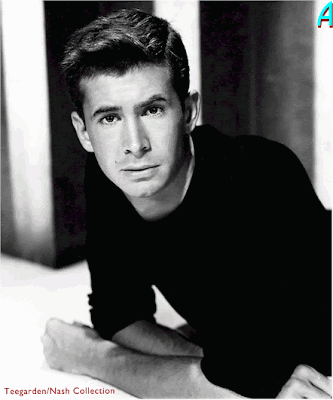Anthony Perkins

Above, a 1958 publicity shot for The Matchmaker; Tony Perkins before Psycho. A sweet, shy, terribly earnest young actor with a neurotic edge, he made a name for himself in the 1950s playing troubled adolescents—most notably in Friendly Persuasion (which won him his only Oscar nomination), Fear Strikes Out, and On the Beach. Though he lost the starring role in East of Eden to James Dean (one year his senior), he impressed director Elia Kazan enough to feature him on stage in Tea and Sympathy. It was Hitchcock, however, who would most successfully exploit the young star’s nervous discomfort with himself and other people. Seen in retrospect, Psycho (1960) plays with eerie cunning upon Perkins’s own identity confusion and troubled family history. “Norman Bates” would be both his blessing and his curse: the part Perkins will always be remembered for and the role the public would never ever allow him to forget. The argument could be made it ruined his career.
After Psycho, the ambitious star fled Hollywood for Europe, in the interest of artistic integrity. There he made a series of mostly disappointing films with usually reliable directors, including Phaedra (Jules Dassin), The Champaign Murders (Claude Chabrol), and The Trial (Orson Welles). My personal favorite from this period is the under-appreciated Goodbye Again (Anatole Litvak) about a charming wastrel who has an unhappy affair with an older woman, played by Ingrid Bergman. By the time Perkins returned to the US in the late 1960s he was no longer convincing as the angst-ridden adolescent and his star had passed. In the 1970s, he managed only supporting roles of modest distinction: see Catch 22, Judge Roy Bean, Murder on the Orient Express, Mahogany, Remember My Name, Winter Kills. There was also a brief fling at screenwriting, exploiting his love of games (The Last of Sheila) and a rare triumph replacing Anthony Hopkins on Broadway in Equus. During the 1980s, he finally gave in to self-parody. At sad best there were three Psycho sequels and Ken Russell’s fearlessly grotesque Crimes of Passion.
Tony Perkins died of AIDS in 1992. Reportedly he led a life as tormented and twisted as that of many of the troubled characters he played. Clearly he used his personal pain to give his best performances their striking vulnerability and veracity. Uncomfortable with his homosexuality to begin with, he was forced to play the cruel masquerade of the gay-actor-pretending-to-be-straight that movie stardom requires. Later in his life, to the puzzlement of many friends, he married and had two children. He claimed to have found true happiness and satisfaction in this greatest and most unlikely of roles, as devoted husband and father.
“The [early] work he did for Paramount set the pattern for his career: lackluster pictures in which he gave sterling portrayals of young men on the brink of emotional disaster. Off the set he was said to be equally volatile—flying into a rage at Shirley MacLaine and dumping a bucket of water over her head, walking barefoot down Sunset Boulevard, eating spaghetti with his hands at a fancy press luncheon. Co-workers found him hard to take—self-important, immature, obsessed with his own stardom, and too scared to drop the mask.”
—Frank Rose, Premiere Magazine 1993
“I think he’d do well to spend a summer on a ranch.”
—Gary Cooper (Friendly Persuasion co-star)
“To me he was a leading man. But he’ll always be remembered as Norman. People won’t let him be anything else.”
— Janet Leigh (Psycho co-star)
“I’ve always felt that it was a very exposable myth that I was somebody. I’ve felt that this was an absurd dishonesty and that if I were close to people, it would be instantly evident and they would say, ‘Well, gee, he’s nothing at all. What do you want to see him for?’”
– Anthony Perkins, Saturday Evening Post 1960

0 Comments:
Post a Comment
<< Home